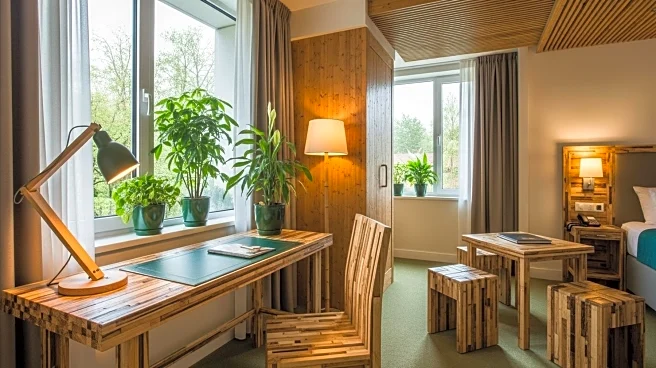What's Happening?
AXIS Architecture + Design has completed the renovation of the 1 Hotel Seattle, marking a significant addition to its portfolio of luxury hotel projects. The firm served as both Design Architect and Architect of Record, collaborating with Studio Collective for interior design. The renovation involved transforming the former Pan Pacific Hotel Seattle into a nature-driven luxury retreat inspired by the Pacific Northwest's landscapes. The project emphasized sustainability, targeting LEED Silver certification and diverting over 70% of construction waste from landfills. The design features organic materials, biophilic elements, and reclaimed wood, creating a sophisticated and modern atmosphere.
Why It's Important?
The completion of the 1 Hotel Seattle renovation by AXIS Architecture + Design highlights the growing trend of sustainability in luxury hospitality design. By targeting LEED Silver certification and incorporating nature-inspired elements, the project sets a benchmark for environmentally conscious architectural practices. This development is significant for the hospitality industry, as it reflects a shift towards sustainable luxury, potentially influencing future hotel designs. The project also enhances AXIS's reputation in the Pacific Northwest, showcasing its expertise in hospitality design and renovation.
What's Next?
Following the successful renovation, AXIS Architecture + Design may continue to expand its presence in the Pacific Northwest and beyond, leveraging its expertise in sustainable hospitality design. The 1 Hotel Seattle's focus on sustainability could inspire other hotels to adopt similar practices, potentially leading to more eco-friendly renovations and constructions in the industry. Additionally, the hotel's unique design may attract guests seeking luxury experiences that are also environmentally responsible.
Beyond the Headlines
The renovation of 1 Hotel Seattle by AXIS Architecture + Design not only enhances the hotel's aesthetic appeal but also contributes to broader environmental goals. By diverting construction waste and using reclaimed materials, the project supports sustainable practices that can reduce the hospitality industry's environmental footprint. This approach aligns with increasing consumer demand for eco-friendly accommodations, potentially influencing industry standards and encouraging more hotels to prioritize sustainability in their operations.









